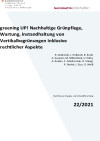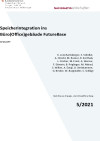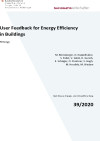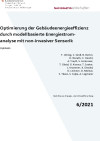Suchergebnisse für "Factsheet: Energietechnologien gestalten, die für alle sinnvoll und nutzbar sind"
greening UP! Nachhaltige Grünpflege, Wartung, Instandhaltung von Vertikalbegrünungen inklusive rechtlicher Aspekte

Im Projekt wurden aufbauend auf umfassenden Erhebungen und Analysen von bestehenden vertikalen Gebäudebegrünungen in Außenräumen (boden- und systemgebundene Fassadenbegrünungen) und vertikalen Innenraumbegrünungen passgenaue Grünpflege-, Wartungs- und Instandhaltungskonzepte erarbeitet und rechtliche Aspekte adressiert. Der "greening UP!"-Wissenspool mit konkreten Empfehlungen und anschaulich aufbereitetem Wissen sowie die Konzeption eines digitalen Tools zur "Ersten Grünen Hilfe" runden das Projekt ab.
Schriftenreihe
22/2021
R. Dopheide, J. Hollands, B. Knoll, A. Korjenic, M. Mitterböck, U. Pitha, A. Renkin, F. Schiefermair, R. Stangl, P. Skolek, I. Süss, O. Weiß
Herausgeber: BMK
Deutsch, 162 Seiten
Downloads zur Publikation
Speicherintegration ins Büro(Office)gebäude FutureBase (SPIN.OFF)

Im vorliegenden Projektvorhaben wurde in ein - in Planung befindliches - Bürogebäude ein Zink-Bromid Redox Flow Batteriespeicher integriert. Anhand dieser Demonstrationsanlage können Fragen, die bei der Integration und dem Betrieb von Batteriespeichern in gewerblichen oder öffentlichen Gebäuden auftreten, beantwortet werden.
Schriftenreihe
5/2021
K. Leonhartsberger, S. Schidler, A. Hirschl, M. Rosner, R. Korthals, L. Fischer, M. Ernst, A. Werner, F. Ettwein, B. Priglinger, M. Meisel, S. Wilker, A. Estaji, O. Stelzhammer, G. Becker, W. Burgstaller, S. Schlägl
Herausgeber: BMK
Deutsch, 139 Seiten
Downloads zur Publikation
Sustainable energy supply for Austria
Rapidly increasing energy consumption and decreasing resources of fossil fuels lead to dramatical economical, ecological and social problems.This study identified the feasible long term potential of renewable energy sources. Then ways were developed how to supply the demand for future energy consumption with renewable energy sources, despite increasing energy services.
FEELings - User Feedback for Energy Efficiency in Buildings

Der Energieverbrauch von Gebäuden wird maßgeblich durch das Verhalten von NutzerInnen beeinflusst. In diesem Forschungsprojekt wird ein neuartiges User-Feedbacksystem untersucht. NutzerInnen geben Feedback zur empfundenen Raumqualität. Auf Basis des Feedbacks werden Einstellungen an der Gebäudetechnik zur Energieeffizienz- und Komfortsteigerung optimiert. Der Proof-of-Concept für dieses neuartige System wird anhand von zwei Use-Cases erbracht.
Schriftenreihe
39/2020
M. Monsberger, D. Koppelhuber, S. Pabst, V. Sabol, H. Gursch, E. Schlager, O. Prentner, S. Singh, M. Herzlieb, M. Wedam
Herausgeber: BMK
Deutsch, 80 Seiten
Downloads zur Publikation
Energy Efficiency and Risk Management in Public Buildings (EnRiMa)
Das zentrale Ziel des EU Forschungsprojektes EnRiMa war es, ein internetbasierendes Entscheidungsfindungsprogramm (Decision Support System - DSS) zu entwickeln, das Betreiber von öffentlichen Gebäuden in der Effizienzsteigerung und CO2 Emissionsreduktion unterstützt. Das DSS wurde mit existierenden Gebäudeleitsystemen, wie DESIGOTM verknüpft und es wurden zwei österreichisches Testgebäude mit dem DSS analysiert. Ebenso wurde ein weiteres Testgebäude in Spanien untersucht.
Optimierung der Gebäudeenergieeffizienz durch modellbasierte Energiestromanalyse mit non-invasiver Sensorik

OptiMAS untersuchte, wie durch eine modellbasierte Energiestromanalyse und unter Verwendung von Anlegesensorik bestehende Gebäude überwacht, analysiert und optimiert werden können, unabhängig von den darin verwendeten HLK-Systemen und deren Automationskomponenten.
Schriftenreihe
6/2021
F. Wenig, C. Seidl, B. Derler, D. Rixrath, C. Heschl, A. Treytl, S. Cerimovic, T. Glatzl, G. Kovacs, T. Sauter, L. Krammer, K. Diwold, D. Lechner, D. Molnar, S. Tkauz, S. Cejka, A. Lugmaier
Herausgeber: BMK
Deutsch, 77 Seiten
Downloads zur Publikation
Gründerzeit mit Zukunft - Demonstrationsprojekt 1: David´s Corner
Energetisch hochwertige Sanierung von drei benachbarten gründerzeitlichen Wohnhäusern in ertragsschwacher Lage.
50 green houses - Development and demonstration of a low-tech façade greening system
Development of a cost-efficient all-in façade greening system („Greening-Toolkit“) including a maintenance concept, involving all trades and processes, for a broad (facing roads) implementation on facades in the urban built environment, combined with a process innovation for simplification of all necessary coordination processes.
greening UP! Sustainable green maintenance, maintenance, maintenance of vertical greenery including legal aspects
Based on extensive surveys and analyses of existing vertical building greenery in outdoor areas (floor and system-bound façade greening) and vertical interior greenery, the project developed tailor-made green care, maintenance and repair concepts and addresses legal aspects. The "greening UP!" Knowledge pool with concrete recommendations and clearly presented findings as well as the conception of a digital tool for the "First Green Aid" complete the project.
Energy Efficiency and Risk Management in Public Buildings (EnRiMa)
The major objective of the project EnRiMa was to develop an internet based decision-support system (DSS) to enable operators of public buildings to increase the system efficiency as well as to reduce the CO2 emissions. The DSS can be linked to existing energy management systems as DESIGOTM. The University of Applied Science Burgenland, Campus Pinkafeld, and ENERGYbase, Vienna, have been used to test and calibrate the EnRiMa DSS.
Demonstration building of the eco²building system: First passive house prefabricated wood building system for commercial and industrial buildings
The EU funded "eco2building" construction system in a timber-frame based modular design represents a systematic approach for energy efficient commercial and industrial buildings. The object of the eco²building demonstration project - the logistics centre in passive-house quality for "Eine Welt Handel AG" - in Niklasdorf was to optimize the planning and construction processes and prepare for the market launch of the eco²building construction system. Accompanying research monitored and disseminated the experience.
SmallWindPower@Home - Impact assessment of building-mounted small wind turbines on performance, people, building and environment
Within the project SmallWindPower@Home the impact of complex obstacles on the local flow pattern as well as on the inflow and the performance of different building-mounted small wind turbines (SWT) had been evaluated. Furthermore the effects of these building-mounted SWT on the building, the resident people and the direct environment were analysed.
SUBURBAHN – test- and demonstration-area for urban development and mobility around public transport stations in the central area of Upper Austria
Targeted, process-oriented conception for the implementation and operation of a test- and demonstration-area for urban development and mobility in Ansfelden involving relevant scientific stakeholders, local and regional stakeholders, decision-makers as well as the interested public according to the living lab approach.
"gugler! build & print triple zero" - subproject 9: Monitoring Gugler - Monitoring, evaluation, optimization GUGLER
The project objective is the measurement of relevant building values (energy consumption, ...), the evaluation of these values compared with the intended objectives and the optimization of the system based on the measured data. As a special innovation, monitoring the storage of alternatively generated electricity using photovoltaic and wind energy in the form of compressed air must be considered.
Urban consolidation Lehen - Subproject 1: Fundamental study for an intelligent e-monitoring
The goal was to refine the energy monitoring for residential buildings as well as to find possibilities to visualise the energy consumption and continuously compare it with the "target consumption" in order to get a signal in time and thereby to be able to communicate it to the users. Different monitoring systems were investigated and the experience was evaluated.
Digital Twin / Building Tracker - Coupling of building simulation with a physical building in real time
The goal of the project ist o couple an office building during operation with its virtual twin, the "building tracker", which will be developed and applied for the first time within the project. Thanks to coupling of monitoring and simulation, innovative building energy management of nearly zero-energy building is possible.
Poly2Facade - Innovative thermal self-regulating solar facades by means of functional polymers
The overall objective of the present project is to develop and implement an optimal overheating protection system based on polymeric materials. The aim is to reduce maximum room temperatures in buildings caused by facade integrated solar-thermal collectors in stagnation.
Using buildings as energy storage - Monitoring project: Detached house H and detached house F Energy source wind power – Energy source solar power
Monitoring and comparison of performance of thermally activated building components in two similarly built, inhabited detached houses with different energy sources (wind and solar power). The functionality of energy supply through wind power or solar energy will be investigated as well as the verification of the practicability of self-regulating system control due to building temperature behaviour. The results provide an insight into the calculation assumptions, system control and feasibility of the smart grid technology.
ECR Energy City Graz - subproject 3: +ERS - Plus Energy Network Reininghaus Süd
The multifunctional neighbourhood "+ERS - Plus Energy Network Reininghaus Süd" was realized within the urban planning area of Graz-Reininghaus. The project aims to optimize the energy concept of the single buildings as well as of the building cluster in order to achieve a plus-energy standard within the residential neighbourhood.
Gründerzeit with future - demonstration project 1: David´s Corner
High value energy efficient refurbishment of an ensemble of three neighbouring Wilhelminian style buildings in a non-lucrative location.
